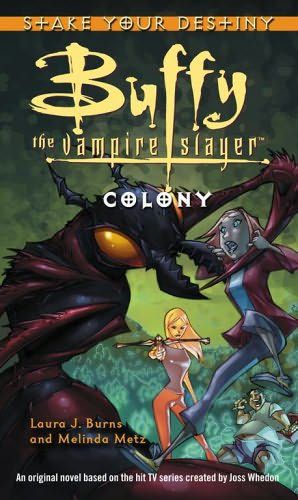This is part of the Rambling Series about Sexism in Jin Yong Stories.
In the last two parts of this rambling series, I looked at damsels in distress and distressed dudes. It’s pretty clear that Jin Yong does not present female characters as being helpless or being unable to do anything useful, nor does he treat them as prizes for male heroes to win from the villains. If anything, it’s actually the opposite. However, the opposite of one sexist thing might be just another sexist thing.
In Jin Yong stories, rather than having a male character compete for the possession of female characters, there are a lot more instances of female characters competing for the affections of the male protagonist. Sometimes, the male protagonist chooses more than one female character to be his mate (polygyny), but usually he only picks one, and the others ‘lose’ and either live a life of celibacy or has a tragic death. The only exception I can think of right now is Cheng Yaojia (程瑤迦) – she falls in love with the male protagonist but later decides to marry a guy who will actually return her affections and she (presumably) lives happily ever after.
The problem with this is that it makes it seem like that the female characters are there to help the male protagonist on his journey rather than have character development journeys of their own.
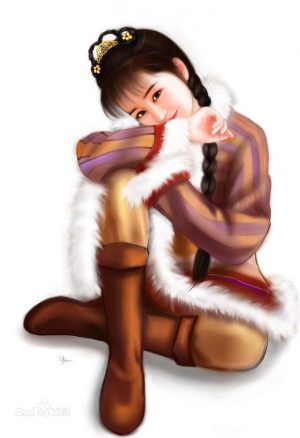
An illustration of Zhao Min.
Let’s take Zhao Min as our first example. She is one of my favorite characters in The Heaven Sword and Dragon Sabre – I felt that the novel became a lot more interesting once she joins the story. She’s ruthless, she’s witty, she’s clever, she wears men’s clothes when she wants to and doesn’t care if everyone knows she’s a woman when she’s doing it, though she does some cruel things she is not a sadist (which makes her more likeable than some of the other villains) and while she is a liar she’s not a hypocrite (which is why even when she’s a ‘villain’ she is more likeable than some of the ‘good’ characters). You can get a better sense of what she’s like by watching the same scene as performed by several different actresses who each have their own interpretation of Zhao Min: 1984, 1994, 2003 and 2009 (only the last two have English subs, but since all of this clips show the same scene from the novel they all have similar dialogue).
At first, Zhao Min is a badass Mongol princess who is determined to keep her family in power and the foil all of those pathetic Chinese people who are trying to end Mongol rule of China – and for her, the end justifies the means. However, during the story, she decides that she does not want to be a princess anymore, and she does not particularly want to be a Mongol either, and she no longer cares if the Chinese drive the Mongols out of China. This COULD have been a great character growth arc – a ruthless and power-hungry mastermind who figures out that some things in life are more important than having power. However, there is just this one little problem…
She gives up on being a badass princess because she fall in love with the male protagonist. After she falls in love with him, she just wants to do things to help him. Thus, it does not read so much like genuine character growth as her just transferring her loyalty from her father and brothers to her lover. For example, she stops doing evil stuff NOT because her moral values changed, but because her lover wouldn’t approve of her doing evil stuff.
Sigh.
I mean, even after she falls in love, she’s still a great character – she’s still wicked smart and sassy – she is just putting all of her talents in service of the male protagonist, rather than using them to pursue her own goals.
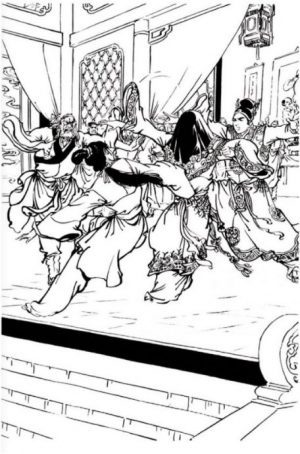
Zhao Min does interrupt the male protagonist when he’s about to marry another female character and uses her wits to get him to abandon his own wedding, but it turned out to be for his own good. (Zhao Min is the one in this picture with really long hair).
And there’s Huang Rong. She’s a great character … but her goal throughout BOTH of the novels in which she appears is to server his male love interest. Yes, she becomes leader of the Beggars’ Sect, but a) she originally became involved in the Beggars’ Sect to make her male love interest stronger (not to make herself stronger, to make HIM stronger) and b) she steps down as leader of the Beggars’ sect so she can be a better wife and mother. She often makes decisions which are not in her own best interests if it serves his interests. And what about her male love interest – does he ever make concessions to help her achieve her goals? No, though to be fair, that would not be easy since she does not seem to much in the way of goals independent of him. Instead, he pursues his own goals for his own reasons, and she’s there to help him.
Also, while *he* gets a major character growth arc, in which he becomes both physically more powerful and develops morally, Huang Rong does not grow much during the story.
Ren Yingying has more of a personal growth arc than Zhao Min and Huang Rong. She starts off as the leader of her own cult of loyal followers, and she is slightly evil, though not really a villain. Yes, she falls in love with the male protagonist, but she does at least have some change of heart which does not entirely revolve around him (she spends time as a prisoner in the Shaolin Temple where she read some Buddhist scriptures which helps her change her ways). Yet her story is still mainly about how she helps the male protagonist or presents him with a dilemma which makes him develop personally. Oh, she does end the civil war and restore peace to the martial arts world – ~entirely off page~.
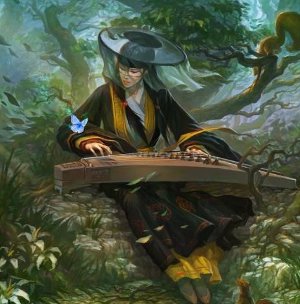
Ren Yingying is, among other things, a good musician (and yes, that’s relevant to the plot).
Yilin – though I find the way she is sexualized to be creepy – actually does get a halfway decent personal growth arc, and that’s one of the reasons I am particularly fond of her. Yet all of her character growth is centered around helping the male protagonist. The Hengshan nuns in general are cool, since they are a rare example of a group of women in a Jin Yong story who are not totally focused on men, and in fact are more righteous than their male counterparts, though the male protagonist ends up being their leader (yes, the male protagonist becomes the leader of an order of nuns).
And Li Wenxiu, the ~only female Jin Yong protagonist~ (from “White Horse Neighs in the West Wind” – there is a summary on Wikipedia) does have goals which aren’t about serving her male love interest, though she pursues her non-romantic goals much less assiduously than most male Jin Yong protagonists, and she also does not have much character growth.
Of the major Jin Yong female characters, the one who comes closest to having a goal other than serving her male love interest (besides Ren Yingying, who really does have the goal of controlling/pacifying the martial arts world even if that is mostly is off-page) is Xiaolongnü. Her goal is to … have a very quiet life almost completely withdrawn from society. Hey, whatever you think of her goal, at least it’s a goal which isn’t related to serving or pleasing any man. Furthermore, she is the only one who asks her male love interest to at least partially set aside his goals to help her reach her goal. Yes, she also sometimes sets aside her goal to help with his goal, but the fact that he yields AT ALL to her at the expense of his own goal is rare in Jin Yong. And yes, it is an abusive relationship at times (for example, she tries to kill him at one point), but that does not change any of what I have said.
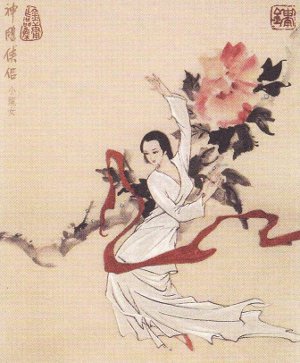
An illustration of Xiaolongnü.
Xiaolongnü also has more personal growth/change than just about any female Jin Yong character – she goes from being an emotionless girl indifferent to the prospect of her own death to being a very sensitive person full of feelings. And what caused this character change? Loving the male protagonist (I know, it’s such a surprise). However, at least after she’s in love she still pursues her original goal.
I suspect it’s not a coincidence that Xiaolongnü/Yang Guo is in some ways a gender reversal of the typical Jin Yong romance – he’s smarter than her, she’s older than him, he’s amazingly handsome (unlike the typically plain-looking male protagonist), she’s much more honest than him, etc. And yet, STILL, it’s really Yang Guo’s story more than Xiaolongnü’s story since his personal struggles, not hers, take center place.
The best single feminist essay I’ve read about ‘strong female characters’ is “Why Strong Female Characters are Bad for Women” by Shana Mlawski. Here’s a quote:
They don’t have to be physically strong, although they can be — The Bride, the women from Crouching Tiger Hidden Dragon, Ripley, Sarah Connor, and even the half-naked Faye Valentine from Cowboy Bebop are strong Strong female characters. Strong just means they have their own goals that move beyond “I want to do whatever the male hero wants to do” or “I want to marry the male hero.” “I want to have a baby” is moderately better – moderately. Let’s try to be a little more creative, huh?
(minor aside: yes I noticed that the character from Crouching Tiger Hidden Dragon the essayist used as an example of good ‘female’ character is arguable a trans male character, but I assume that she can’t read Chinese and thus has never read Iron Rider Silver Vase where that character is depicted as identifying as male.)
I think this really gets to the heart of what’s wrong with how Jin Yong uses his female characters (I mean, there are other sexist and misogynist things in his books which I haven’t addressed in this series, but I’m not trying to address everything). They are generally not treated as characters who grow and pursue whatever aspirations they develop – instead, they mainly function in the story to serve as accessories to the male protagonist and his character growth arc / storyline. She is beautiful to please him (and the presumed straight male readers), her intelligence is there to help him with his quest rather than a quest of her own.
So am I basically just asking for more female protagonists? Actually, I do want more female protagonists, but that’s not the point, or rather, it’s only part of the point. Plenty of male supporting characters in Jin Yong stories have goals which have nothing to do with female love interests, and while the protagonists tend to experience the most character growth, supporting male characters sometimes change and grow too (more often than supporting female characters, I may add).
It’s not about whether the male characters are competing over possession of a female, or the female characters are competing over possession of a male. It’s not about who is ‘weak’ or who is ‘strong’. It’s about who gets to be deemed worthy in their own right, and gets to have their own journey rather than just be part of someone else’s journey.
Advertisements Share this:


